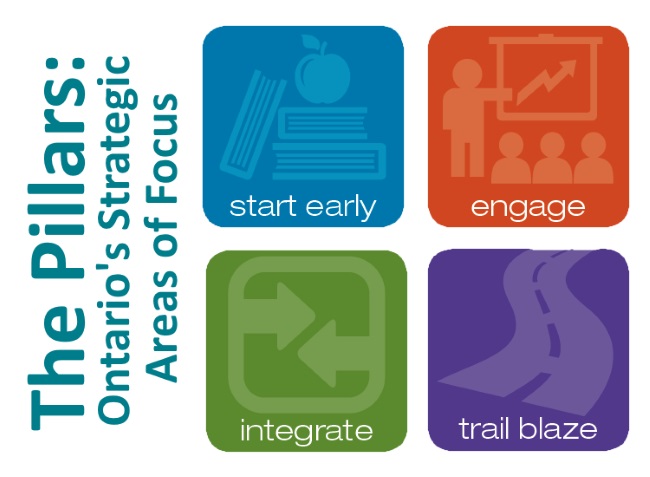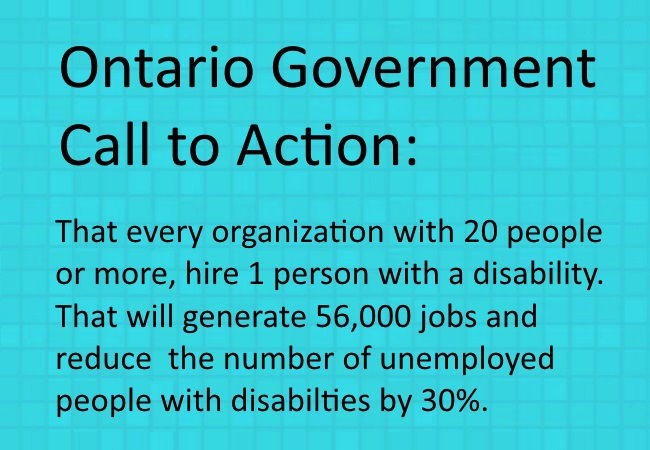Advocates largely agreed, but could only take their optimism so far in the absence of a more detailed plan.
BY MICHELLE MCQUIGGE, THE CANADIAN PRESS
TORONTO – Ontario businesses with at least 20 employees should do their part to tackle unemployment rates among the disabled community by committing to hire at least one person from that demographic group, the provincial government said Monday.
A long-awaited, four-pronged employment strategy for people with disabilities also promised to create opportunities for disabled youth to get job experience, roll out a supported employment pilot project and have the province work harder to lead by example as a barrier-free employer for disabled workers.

Ontario’s disability advocacy community said it’s reserving judgment on whether the strategy will live up to its own expectations and bring about material change for the people it’s supposed to help.
Rich Donovan, CEO of business research group Return on Disability, praised the government for a sweeping vision and enlisting three ministries to bring it to fruition. But he said the government will soon realize that words are not enough when dealing with an issue as complex as accessible employment.
“It’s a happy day because of the announcement, but when you start to assess what has to happen next, that should scare the crap out of you,” Donovan said.
The province’s call for action comes as it tries to tackle stubbornly high unemployment rates among people with disabilities, which Statistics Canada figures show are at least twice the national and provincial levels at all age groups.
The government’s plea for more businesses to hire disabled staff is neither binding nor enforceable, but Accessibility Minister Tracy MacCharles said it could create 56,000 new jobs and reduce the number of unemployed Ontarians with a disability by 30 per cent if heeded.
MacCharles said Ontario must address the needs of a growing population — the provincial and federal governments currently estimate one in seven people has a disability and expect the number will rise as the population continues to age.
Businesses with fewer than 20 employees may find it more difficult to comply with the government’s request, MacCharles said, but all companies should step up to tap into an overlooked talent pool of well-educated, highly motivated workers.
“It’s a call for action … because it’s good business,” she said in an interview. “We want to challenge employers to work through any barriers they have, whether it is how to find people with disabilities or systemic barriers they have, and tap into that untapped labour pool.”
MacCharles said the government is launching a new online hub to make it easier for employers to get on board.
She said the platform will help connect businesses with people with disabilities, but offered few other details. The government is also creating the Employers Partnership Table — a working group of business leaders who will share best practices with the government.
The focus on business is one part of the employment strategy, which the Ontario Liberals first promised to develop in 2013.
Another major component is the need to start creating employment opportunities for people with disabilities at a young age. Like adults, disabled youth are currently twice as likely to be unemployed as their able-bodied peers, the government said.
The strategy promises to build an employment component into the Ontario Disability Support Program, the province’s primary social assistance offering for the demographic. It said a new case management approach for youth in the program will help identify job goals and make plans to attain them.
The government also promised to support job-related learning experiences for students and help with the transition from school to the workforce.
Students with autism spectrum disorders will be particular targets of the government’s early transition efforts. The strategy did not offer details on how the programs would look.
The third piece of the employment strategy involves integrating and co-ordinating employment services, MacCharles said, adding that a shift towards a supported employment approach is part of that picture.
A supported employment program would offer a range of services for employers and employees alike, featuring everything from job-readiness training to on-the-job coaching services and financial support for adaptive technology.
MacCharles said the government will run a pilot project in 2018 by testing the program in three Ontario communities, Timmins, Belleville and Cornwall. If successful, she said the program could expand provincewide.

The fourth component involves the government itself taking a more proactive role in hiring people with disabilities, who currently comprise 12 per cent of the public services workforce.
The government provided few figures on the costs of its initiatives, only saying it budgeted $1 million for public education related to the new strategy and an additional $2 million for employment supports under the ODSP.
“I’m confident that the areas of focus are the right ones to help raise the importance of creating inclusive environments and increasing that persistently low employment rate for persons with disabilities,” MacCharles said.
Advocates largely agreed, but could only take their optimism so far in the absence of a more detailed plan.
